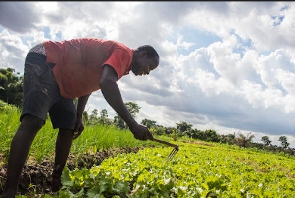Ibrahim Akalbila, the National Coordinator of the Ghana Trade and Livelihood Coalition (GTLC) says it is worrying that consistent efforts are not made to generate reliable market access for farmers.
Speaking in an interview with Ghana News Agency in Bolgatanga, Mr Akalbila said the government flagship programme which was built on five pillars were deviating from its original plans and therefore needed a holistic implementation and not provision of seeds and fertilizer alone.
He said the Planting for Food and Jobs (PFJs) programme run for the past five years was based only on production, where the provision of fertilizer and seeds were the only intervention and that was inadequate.
“There were cases where seeds sown did not germinate, some fertilizer supplied was not what the farmers needed and what only works for us is when we have a good rainfall, however, the key aspect we needed was market access,” he said.
As part of the PFJs interventions, Mr Akalbila indicated that inadequate extension services to farmers, lack of marketing opportunities and E-Agriculture that allowed farmers and stakeholders to monitor and track activities and progress of the farmers through use of technology was woefully poor.
Mr Akalbila decried the “Wholesale purchase of seeds supply and fertilizer importation to the farmers by government and the private sector with Policy institutions meddling with sales of food to farmers,” and said it was not a safe way to go as it had caused the trust of the farmers in the interventions to drop.
The farmers he indicated were given farm inputs, but not educated on the mode of applications “It is not enough until people are educated on how to use them, otherwise they would continue to do the old ways of cropping and learning from peers whether right or wrong.”
Responding to his outfit’s interventions, he reiterated that the GTLC continued to focus on whole market structure as an aggregate to business and cited the promotion of Ghana’s locally produced rice particularly from the northern parts of Ghana, where people shieded away from it because of stones.
According to him, the GTLC interventions had led to people investing in milling facilities to remove stones from the rice, but he said it was not about milling to remove stones but required a complete market system.
Mr Akalbila also bemoaned the current challenge of food prices in the market and said it was a food security threat, “if anyone is unable to buy food then he or she is not food secured.”
Click to view details



Business News of Friday, 25 November 2022
Source: GNA

















